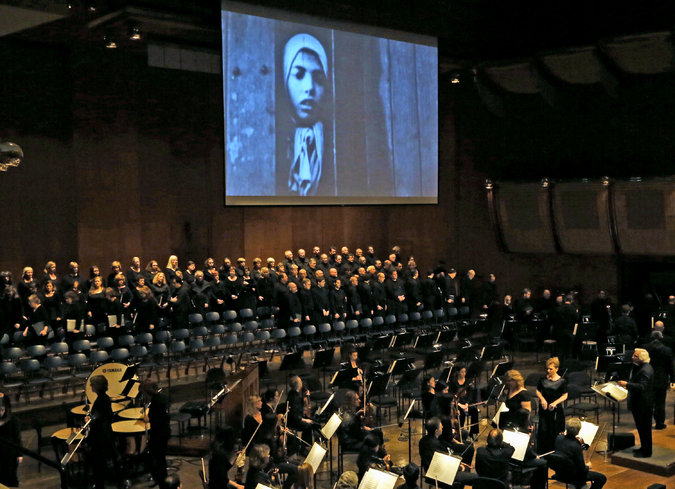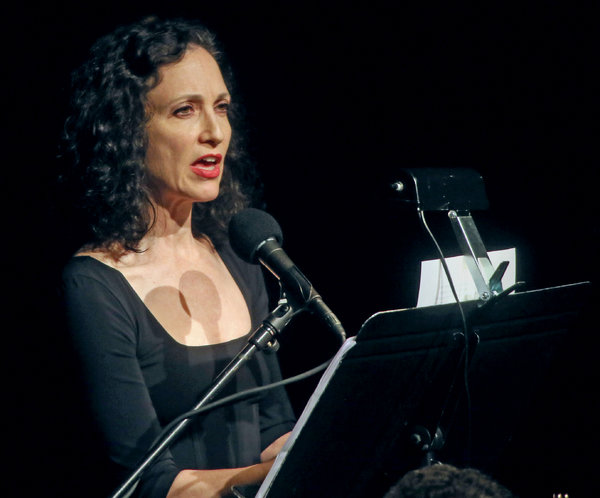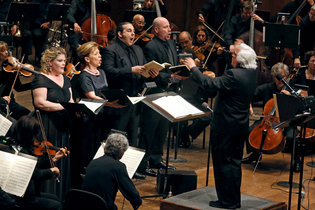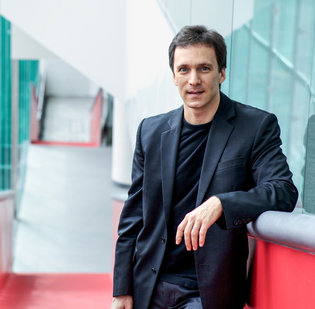 March 06, 2015
March 06, 2015
MURRY SIDLIN’S ‘DEFIANT REQUIEM’ RETURNS TO AVERY FISHER HALL
By JAMES R. OESTREICH
The Orchestra of Terezin Remembrance and the City Choir of Washington performing “Defiant Requiem” at Avery Fisher Hall in 2013.
Can there be more than one way to think and feel about “Defiant Requiem,” the concert-drama based on musical activity in the Nazi concentration camp at Terezin during the Holocaust, conceived by the conductor Murry Sidlin? On the surface, at least, the production seems to represent only good — noble intentions, spiritual uplift and redemption — and it unquestionably holds profound meaning for many who are connected with it or have witnessed it.
It has been performed more than 30 times since its premiere in Portland, Ore., in 2002. It played in Avery Fisher Hall in 2013 and returns there on Monday evening, with Mr. Sidlin conducting the Orchestra of Terezin Remembrance, the Collegiate Chorale and vocal soloists.
“Defiant Requiem” commemorates and partly re-enacts 16 makeshift performances of Verdi’s Requiem by a chorus of prisoners with piano accompaniment given in Terezin, a town some 40 miles northwest of Prague in what is now the Czech Republic. The production includes not only historic film clips and roles for actors — in this case, Bebe Neuwirth and John Rubinstein —
but also a complete performance of Verdi’s Requiem, with full chorus and orchestra.
In addition, there is a 2012 documentary film, “Defiant Requiem,” based on a Sidlin performance of Verdi’s Requiem at Terezin and narrated by Ms. Neuwirth.
“This was one of those stunning events where every single story is compelling and profound,” Ms. Neuwirth said in a recent telephone interview. “I try to put myself in the prisoners’ unimaginable world, in hell and making music.”
So what moved the historian James Loeffler to condemn “Defiant Requiem,” in a 2013 article in Tablet, a magazine devoted to Jewish life, as an example of a new form of “Holocaust Music”? Such efforts, he wrote, “represent a tragically misconceived approach that distorts the memory of the Holocaust and slights the very musicians that they purport to honor.”
More on that later. Better first to explore some of the meanings “Defiant Requiem” has for its supporters. A good place to start is at the very beginning of the Terezin events, with Edgar Krasa, who is featured prominently in the documentary.
Mr. Krasa, now 94 and living with his wife in Boston, was transported from his home in Prague to Terezin in 1941. There he was for a time a bunkmate of Rafael Schächter, the hero of the story, who arrived soon after.
Schächter was a pianist and conductor, and among the few things he had been able to take with him to Terezin were several piano-vocal scores, including that of Verdi’s Requiem. Once there, he started an informal music program to help maintain the spirits of his fellow inmates, an extraordinary number of whom were musically or otherwise artistically inclined.
He eventually adopted the Verdi work as a cause, since many lines in its text could be read as defiance of the Nazi captors. (“Therefore when the Judge takes His seat, whatever is hidden will be revealed: Nothing shall remain unavenged.”) Mr. Sidlin, in a telephone interview, quoted Schächter to the effect that “we can sing things to them that we can’t say to them.”
Schächter assembled a chorus of 150 and taught them by ear to sing their parts by rote, a complex and difficult task. Few of his singers were trained musicians, and most were coming off hard days of labor.
He had to restock and retrain the chorus repeatedly, as members died or were sent to Auschwitz. By the time of the last performance, in 1944, the chorus numbered 60.

Bebe Neuwirth, above, and the clarinetist Jon Manasse will perform in “Defiant Requiem” Monday at Avery Fisher Hall.
The audiences for the performances consisted mainly of prisoners, but the listeners to that last performance included representatives of the International Red Cross, as part of the Nazis’ effort to pass Terezin off as a model Jewish community where life was good and the arts thrived. To a remarkable extent, the arts did thrive in Terezin, with no thanks to the Nazis.
Schächter was strongly upbraided by the council of Jewish elders in Terezin for using a Roman Catholic Mass, in Latin, as a vehicle for the edification of Jews. And the very fact that the performances could be construed as defiance, they argued, put the singers’ lives in jeopardy.
Now here is what Mr. Loeffler, the historian, writes about Mr. Sidlin’s project: “By celebrating Jewish musicians for their performance of a Catholic Mass (written in homage to an Italian nationalist leader), the ‘Defiant Requiem’ propagates the persistent anti-Semitic trope, albeit unintentionally, that Jews can only express themselves artistically by borrowing and corrupting European Christian music.” (The Italian nationalist referred to was Alessandro Manzoni, the author of the historical novel “The Betrothed.”)
Both Schächter and Mr. Krasa were transferred to Auschwitz in 1944 and sent on the great death march out of the camp in January 1945 as Soviet forces approached. Schächter died on the march; Mr. Krasa escaped by plunging into a snow-filled ditch, where he was shot and left for dead. “I’ve devoted my life to extending Rafael Schächter’s legacy,” Mr. Krasa said in a telephone interview.
Mr. Krasa sang in the Terezin choir, and on Monday his two sons and a grandson will join the Collegiate Chorale. Mr. Krasa would probably have been there to applaud Mr. Sidlin’s efforts in person if he had not taken a bad fall recently, which has limited his mobility.
“I’ve asked Murry,” he said, “ ‘What will happen when you can’t continue?’ ”
To bring matters quickly to the present, another participant in the performance on Monday will be the clarinetist Jon Manasse, a longtime star of the rich New York freelance pool of musicians and a member of the Orchestra of St. Luke’s, the Mostly Mozart Festival Orchestra and the American Ballet Theater Orchestra. Mr. Manasse, 50, learned of “Defiant Requiem” in 2013. Knowing that it was related to the Holocaust, he said in an interview, he would have liked to participate then to represent his paternal grandparents but had prior commitments.
Alfred Manasse, his grandfather, was one of the 937 passengers on the “Voyage of the Damned” (as Stuart Rosenberg’s 1976 film called it), the 1939 passage of the ocean liner St. Louis from Hamburg to Cuba, where it was not allowed entry. The ship had to return to Europe, and Alfred Manasse died at Auschwitz, as, apparently, did his wife.
Mr. Manasse has been thinking a lot about the European side of his family of late, he said. He played on a three-week tour with the Cleveland Orchestra, also in 2013, and the stops included Augsburg, Germany, his grandfather’s hometown, and Frankfurt, his father’s.
When “Defiant Requiem” came around again, he leapt at the opportunity, though he still didn’t know a lot about the project. In particular, he wasn’t at first aware of the crucial role he will play at the end of the program, when the solo clarinet intones the familiar prayer for peace, “Oseh Shalom,” as the performers start to leave the stage and process up the aisles.
It promises to be a tough, deeply emotional assignment for Mr. Manasse. But he played at his father’s funeral, he said, and musicians have prepared throughout their careers to face nervous-making and unsettling moments. “I will be completely involved in my feelings, and the symbolism of my being there will be palpable,” he said. “But I will immerse myself in the meaning of the music and play.”
“Defiant Requiem” has many admirers besides those directly involved in it.
“It’s like a modern oratorio,” said Mark Ludwig, a violist in the Boston Symphony Orchestra and the executive director of the Terezin Music Foundation. “It is a powerful experience for an audience to remember, and it gives a glimpse into how important the arts were in Terezin.”
Mr. Loeffler, on the other hand, may be the harshest critic of “Defiant Requiem,” but he is far from the only one.
“A lot of scholars hate the show, the way they did ‘Schindler’s List,’ claiming that it misrepresents or exploits the Holocaust with cheap melodramatic effects,” said Michael Beckerman, a musicologist at New York University who has established a specialty in composers at Terezin. “But this fits into a long tradition of tension between performers and scholars. For some, Murry Sidlin’s interpretation of history would only be right if it looked like a scholarly paper.”
Mr. Loeffler calls “Defiant Requiem” “a virtual multimedia extravaganza,” “replete with factual errors and historical distortions in the name of a theme of spiritual resistance.”
“In some versions,” he adds, “actors reportedly wore striped pajamas — though their real-life models in Terezin did not.”
But Mr. Sidlin makes no great claims to scholarship. “What I wrote,” he said, “was as close as I could get to what the survivors related.”
Besides, he points out, scholars commit inaccuracies, too: “There were never striped pajamas in ‘Defiant Requiem,’ ” he insists, though an illustration on the Lincoln Center website for Monday’s performance shows a conductor wearing them.
“Jews are often accused of going like lambs to the slaughter,” he said. “I wanted to show that this was their way of resisting.”



